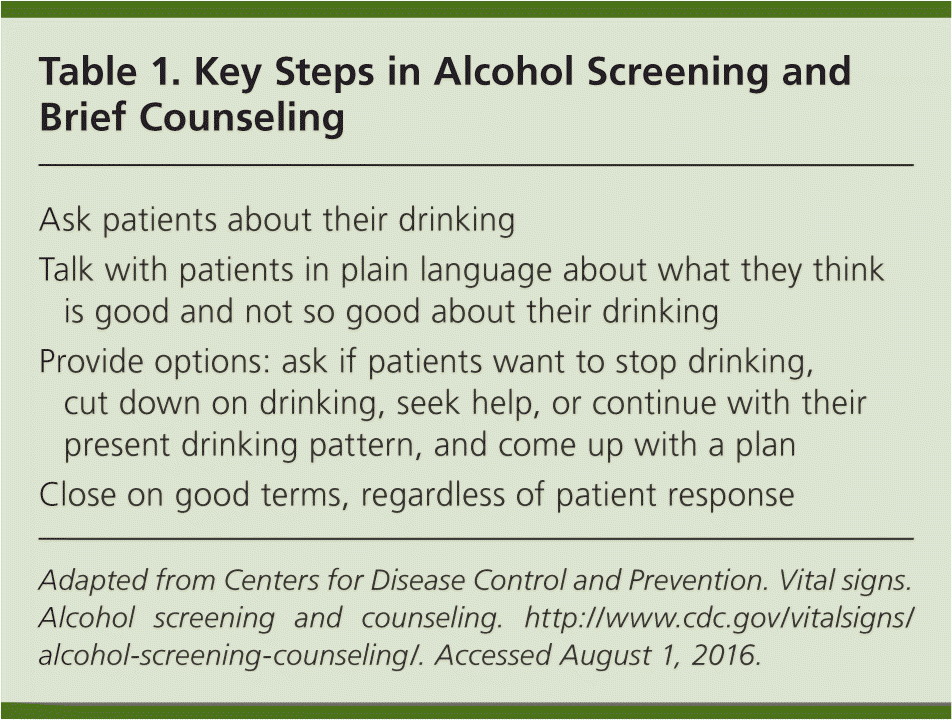
Am Fam Physician. 2017;95(1):6-7
Author disclosure: No relevant financial affiliations.
Fetal alcohol spectrum disorders (FASDs) affect an estimated 2% to 5% of children in the United States.1 Persons with FASDs have lifelong behavioral, intellectual, and physical disabilities that are solely the result of maternal alcohol consumption during pregnancy. Through its Vital Signs report, the Centers for Disease Control and Prevention (CDC) recently highlighted the preventable burden of disability associated with alcohol-exposed pregnancies, and emphasized long-standing recommendations that physicians screen all patients for harmful alcohol use and that women avoid alcohol at all times during pregnancy.2,3 Because nearly one-half of pregnancies are unplanned and most are not recognized in the first several weeks, the CDC targeted reproductive-aged women who were not using contraception. Some on social media expressed concern that the CDC messaging implied women were not properly governing their own behavior. The CDC report aimed to provide accurate information to physicians and patients so they could take actions as appropriate.4 The goal was to prevent potential negative outcomes and minimize long-term disabilities, while also addressing potential stigma and parental guilt.
Fetal brain development continues throughout pregnancy, and there is no trimester in which it is safe to drink alcohol. Studies clearly demonstrate that heavy drinking and binge drinking (for women, four or more drinks within two to three hours) are harmful to the developing fetus, but currently no amount of alcohol use is considered safe during pregnancy. Studies on light and moderate drinking during pregnancy have inconsistent findings regarding harmful effects on the fetus.5,6 Although heavier alcohol use is a strong risk factor for FASD, the ability to metabolize alcohol varies from person to person and can be affected by genetic factors. This variability contributes to current recommendations that pregnant women abstain from alcohol altogether.
Family physicians are well suited to counsel patients about alcohol use and pregnancy. All adults should be screened for harmful effects of alcohol (Table 1).7 Behaviors among those who are not trying to become pregnant are a major factor in the prevention of FASD, which is the rationale for outreach to sexually active women regardless of immediate pregnancy plans. An estimated 3 million women are sexually active, do not use contraception, and drink alcohol; these women are at risk of alcohol-exposed pregnancies.2 Many women do not know they are pregnant during the first four to six weeks of gestation, a time when fetal development is particularly vulnerable to teratogens. By providing patients with information about the potential harms of alcohol at any point in pregnancy and ensuring that contraception is accessible to those who do not want to become pregnant, physicians can reduce unintended fetal alcohol exposures. Preconception counseling has optimal reach when incorporated into primary care visits for other purposes. Family physicians can counsel patients to develop a reproductive life plan and can help those who do not wish to become pregnant stay up to date on contraceptive options.8 Physicians can also remind women who intend to become pregnant to stop drinking alcohol when they discontinue contraception.

| Ask patients about their drinking |
| Talk with patients in plain language about what they think is good and not so good about their drinking |
| Provide options: ask if patients want to stop drinking, cut down on drinking, seek help, or continue with their present drinking pattern, and come up with a plan |
| Close on good terms, regardless of patient response |
More than 50% of nonpregnant women report recent alcohol use, compared with about 10% of pregnant women, suggesting that most women avoid alcohol once they find out they are pregnant.9 Although physicians need to warn patients about the risks of alcohol use at any time during pregnancy, they should also provide reassurance to women who drank alcohol before they realized they were pregnant that good birth outcomes are still likely. Physicians should also assist women who have difficulty avoiding alcohol once they recognize they are pregnant.
Physicians are among the most trusted professionals with whom patients interact, and they have key opportunities to screen for alcohol misuse, provide brief intervention, and, if needed, refer patients who are trying to reduce alcohol use. A screening and intervention guide is available at http://pubs.niaaa.nih.gov/publications/practitioner/PocketGuide/Pocket.pdf. Alcohol screening and brief intervention, coupled with regular discussion of the patient's reproductive life plan and ready access to effective contraception, can help ensure a healthier next generation while respecting women's autonomy.
